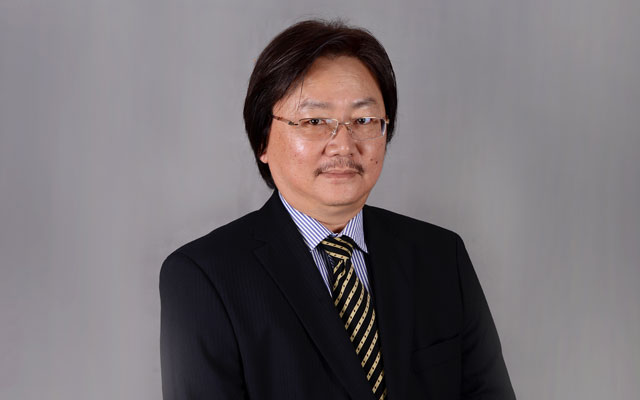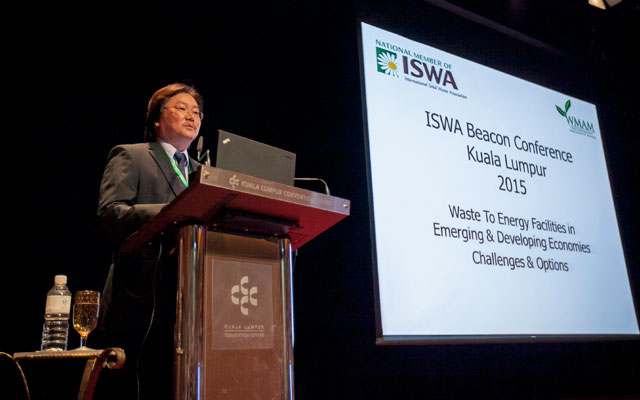A successful bid by Waste Management Association Malaysia brings a Western-centric congress back to Asia after a decade. Chairman Ho De Leong tells the win bodes well for his Asian peers
Malaysia won the bid against Spain for the International Solid Waste Association (ISWA) World Congress 2018. How did this all start?
It was all thanks to Malaysia Convention & Exhibition Bureau (MyCEB) which had urged us (Waste Management Association Malaysia, WMAM) in 2013 to bid for the congress. That was, however, for the ISWA World Congress 2017 which incidentally was open for bidding.
When we agreed, MyCEB supported us through the process. At the ISWA board meeting in Singapore in 2014, we were up against the US national member, Solid Waste Association of North America. We lost the bid by just one vote. It was a very painful moment for us.
Nevertheless, we were encouraged by the board to bid again for the subsequent congress in 2018. We updated our presentations and bid documents, and I led the team in 2015 for the 2018 bid. This time, we were victorious and won against the Spanish national member.
It helped that I was a board member of ISWA and had some influence over other board members to encourage a vote in favour of Malaysia.

Will MyCEB continue to support the local host during ISWA World Congress 2018?
Definitely. MyCEB will provide us with subvention support towards overseas marketing and promotion of ISWA World Congress 2018 as well as on-site support such as liaison with government agencies and industry suppliers. It will also provide travel grants for young professional delegates from developing nations to attend the congress.
The congress also has support from the Ministry of Energy, Green Technology and Water, Malaysia, Ministry of Urban Wellbeing, Housing and Local Government, Ministry of International Trade and Industry, and Kuala Lumpur City Hall.
What does ISWA 2018 mean for Malaysia and the Asia region?
Where solid waste management is concerned, Malaysia is still in its infancy and has a lot to catch up on where best practices are concerned.
The congress is bound to raise Malaysia’s solid waste management standards to a higher level. It will be a gathering of industry experts who will share their knowledge and expertise. Malaysian and South-east Asian participants can benefit from that.
Furthermore, having this congress in Malaysia will benefit delegates in this region who will now have easier access to experts from around the world without having to travel far. ISWA is generally Western-centric and most congresses in the past were held in the US or Europe. This year’s congress will be in Serbia, next year in the US, and in 2019 it will head to Spain.
The last ISWA Congress in South-east Asia was in Singapore, back in 2008. It took 10 years for the congress to return to this region, and we have no idea when it will come back here again. Hence this is a good opportunity for Asians to capitalise on the event.
Do you expect a record number of delegates from South-east Asia then?
We certainly expect a large turnout from this region due to the close proximity.
We are targeting up to 1,500 delegates in total and if we achieve this, the 2018 congress will be the largest ever. About 60 to 70 per cent of attendees we think will be regional participants, who mainly comprise researchers, academicians, waste management practitioners, and university students studying environment related subjects.
How will you hit those numbers?
With the conference content which will be world class. It will be vetted by the scientific committee and supported by a pool of experts from within ISWA’s membership.
The conference will be followed by technical tours to waste management facilities around Malaysia where we will show them how landfills are managed in a tropical climate, our resource recovery facilities and our waste-to-energy facilities. We have not finalised the technical tour programme though, and are still deciding if it would be a full-day or two-day arrangement.
It is still early days but there will be pleasant surprises in store for our delegates, as we wish to make this a very memorable congress.
Malaysia, itself, will be a major draw as it is a value for money destination. Here you can get a five-star hotel for US$100 a night. In Europe or US, you will have to pay much more. The congress venue, Kuala Lumpur Convention Centre, is next to the iconic KL Twin Towers.
Will getting good speakers be an issue for you?
Not at all. Speakers will mostly be ISWA members from all over the world. There has always been an abundance of speakers, as experts want to use this platform to share their experience, expertise and technical papers and findings.
What aspect of the congress will be a challenge then?
Sponsorship. In today’s uncertain economic climate, companies are cutting back on their budgets. We will appeal to strong supporters of ISWA Congresses, and seek out other institutions and corporate sponsors too.
We are focused on getting sponsors as early as possible. This is important for an organiser as you can plan a lot more if you have sufficient funding. Sponsorship is critical to defray the cost of running a conference, especially the major ones such as venue rental and the gala dinner.
If we are able to get sponsorship upfront, we can allocate concessionary seats for university students and professionals from less developed countries at a subsidised fee. This will be an opportunity for them to benefit from an international congress. The exposure they get from the scientific presentations and the technical tours, may help them make a difference in the way solid waste is treated back home.
We will also look for local government sponsors for in-kind assistance, such as in hosting the gala dinner venue.
Besides the ISWA Congress, how else does WMAM engage its members?
We invite local and international industry experts to share their knowledge and experience to keep our members abreast of the latest know-how and waste management technologies. We also invite our members to participate in other international conferences and exhibitions.
WMAM has organised international beacon conferences which focus on specific topics under our affiliate Association ISWA since 2014 and these events attract much interest from participants from all over the world.
Does WMAM conduct community projects too?
We organise regular seminars and conferences for the public and students to raise awareness of recycling and what can be done to preserve the environment and reduce our carbon footprint. We also organise visits to landfills and other waste management facilities to see how waste can be converted to clean energy.
Do you enjoy this aspect of the job?
Yes. (Events) bring people of common interests together, to share knowledge and network. When you are at work, your creativity is limited to the scope of your work and (you are occupied with) meeting bottom lines. But when you are organising a conference for the association, you can be a creative designer. There is also the opportunity to travel and see how international conferences are handled, network with international (peers) and then try and apply the best practices back home.
What is your biggest responsibility when organising an event?
It is ensuring you meet the targeted number of participants because you have to commit to all the major costs. It is also important to ensure that the participants enjoy the event throughout their stay and leave feeling satisfied and happy.
The other challenge is getting delegates to register early. Most of them tend to register at the last minute, which can be a nightmare for organisers.
As WMAM chairman, what more do you wish for your association?
I would like to see the association expand to include conducting trainings and courses to qualify waste managers. While waste management is a growing industry, there are not many qualified waste managers in Malaysia. To conduct trainings and courses, the association will have to set up a centre of excellence which also provides accreditation in waste management courses. Currently we are in talks with waste management institutions overseas to tailor some courses for certificate and foundation level as a start.
Man of many hats

-
Ho De Leong heads the biggest waste management company in Malaysia, SWM Environment, which has a workforce of over 8,000 employees
-
He has more than 35 years of varied corporate and management experience in various key industries. His expertise spans across areas of construction and consultancy, project management, and business development
-
He is a board member of ISWA as its Regional Development Network Representative for Asia-Pacific since 2014
-
In addition to his role as founding member and chairman of the Waste Management Association of Malaysia, Ho is also a founding member of the Asia Pacific Waste & Environment Alliance, which was established in 2015
-
He is an associate member of the Chartered Institute of Waste Management
-
He is an executive advisory board member for the Solid Waste Institute for Sustainability, University of Texas Arlington











